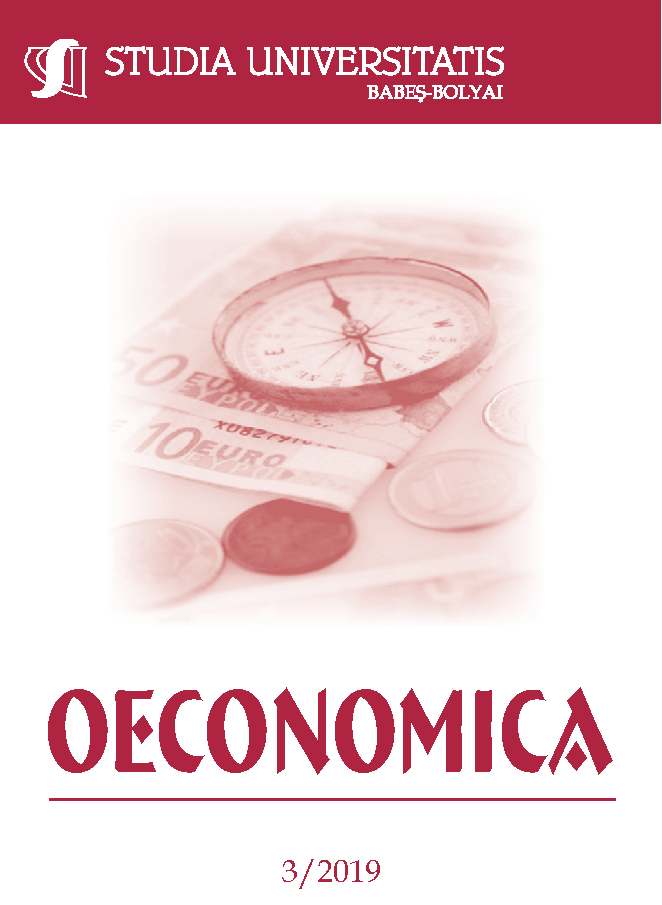CORPORATE TAX AVOIDANCE PRACTICES: AN EMPIRICAL EVIDENCE FROM NIGERIAN FIRMS
DOI:
https://doi.org/10.2478/subboec-2019-0014Keywords:
Tax Avoidance, Thin capitalization, Leverage, Firms Size, Transfer Pricing, Intangible AssetsAbstract
This study examined the existence of corporate tax avoidance practices among the public listed firms in Nigeria. Secondary data were obtained from annual published reports from selected Nigerian firms listed in Nigeria stock exchange from 2006 to 2017. Panel Data analysis technique was used to analyse the effect of independent variables (Thin capitalization, Leverage, Firms Size, Transfer Pricing, and Intangible Assets) on dependent variable (Corporate Tax Avoidance). The result showed that thin capitalisation, firm size, profitability, leverages, intangible assets, and transfer pricing are significantly related with corporate tax avoidance. Thin capitalisation, profitability and transfer pricing are the primary driver of corporate tax avoidance. It is concluded that there are several corporate tax avoidance practices employed by Nigerian firms to aggressively reduce their corporate tax liabilities in Nigeria.
JEL Classification: H26, G31, H29, L25, L11, E22
References
Adegbite T.A. (2015). The Analysis Of The Impacts Of Corporate Income Tax (CIT) On Revenue Profile In Nigeria. American Journal Of Economics, Finance And Management, 1(4), 312-319
Adegbite T. A., Fasina H. T, & Araoye, F. E. (2019).Tax compliance and personal income tax perceived performance in Oyo State.Accounting and Taxation Review, 3(2): 22- 3
Alalade, C. B. (2004). The Economic Performance Of International Oil Firms In Nigeria. Bournemouth University.
Bartelsman, E. J., & Beetsma, R. M. W. J. (2003). Why Pay More? Corporate Tax Avoidance Through Transfer Pricing In OECD Countries. Journal Of Public Economics, 8 (10), 2225-2252.
Canellos, P. C. (2001). Tax Practitioner's Perspective On Substance, Form And Business Purpose In Structuring Business Transactions And In Tax Shelters, A. SMUL Rev., 54, 47.
Chan, C. W., Troutman, C. S., & O’Bryan, D. (2000). An Expanded Model Of Taxpayer Compliance: Empirical Evidence From The United States And Hong Kong. Journal Of International Accounting, Auditing And Taxation, 9(2), 83–103.
Chege, P. N. (2013). The Organisation Of Economic Cooperation And Development (OECD) Transfer Pricing Guidelines: An Evaluation Of Their Effectiveness In The Kenya’s Tax Regime. (Master Of Law Desertation ), University Of Nairobi, University Of Nairobi Kenya.
Cunningham, R. (2014). The Comprehensive Guide To The World’s Leading Transfer Pricing Firms. International Tax Review.
Dean, K. A. (2014). Transfer Pricing: An Evaluation Of Section 31 Of The Income Tax Act. (Master Of Law), University Of Cape Town, South Africa.
Desai, M. A., & Dharmapala, D. (2009). Corporate Tax Avoidance And Firm Value. The Review Of Economics And Statistics, 91(3), 537-546.
Ebeh Ezeoha, A., & Ogamba, E. (2010). Corporate Tax Shield Or Fraud? Insight From Nigeria. International Journal Of Law And Management, 52(1), 5-20.
Elitzur, R., & Mintz, J. (1996). Transfer Pricing Rules And Corporate Tax Competition. Journal Of Public Economics, 60(3), 401-422.
Eugene, N., & Abigail, E. C. (2016). Effect Of Tax Policy On Economic Growth In Nigria (1994-2013). International Journal Of Business Administration, 7(1), P50.
Foley, S. (2012). Transfer Pricing - A Rising New Dawn In Nigeria. Global Head Of Transfer Pricing Services. 10(5). 52-67
Gallemore, J., & Labro, E. (2015). The Importance Of The Internal Information Environment For Tax Avoidance. Journal Of Accounting And Economics, 60(1), 149-167.
Grubert, H. (2003). Intangible Income, Intercompany Transactions, Income Shifting, And The Choice Of Location. National Tax Journal, 5(3), 221-242.
Hanlon, M., & Shevlin, T. (2013). Book-Tax Conformity For Corporate Income: An Introduction To The Issues. Journal Of Chemical Information And Modeling, 5(3), 12-32.
Hoi, C. K., Wu, Q., & Zhang, H. (2013). Is Corporate Social Responsibility (CSR) Associated With Tax Avoidance? Evidence From Irresponsible CSR Activities. The Accounting Review, 88(6), 2025-2059.
Johnson, R., & Soenen, L. (2003). Indicators Of Successful Firms. European Management Journal, 21(3), 364-369.
Kanagaretnam, K., Lee, J., Lim, C. Y., & Lobo, G. J. (2016). Cross-Country Evidence On The Role Of Independent Media In Constraining Corporate Tax Aggressiveness. Journal Of Business Ethics,10(5), 1-24.
Kim, J.-B., Li, Y., & Zhang, L. (2011). Corporate Tax Avoidance And Stock Price Crash Risk: Firm-Level Analysis. Journal Of Financial Economics, 10(3), 639-662.
Kotter, J. P. (2008). Corporate Culture And Performance: Simon And Schuster.
Leigh, N. G., & Blakely, E. J. (2013). Planning Local Economic Development: Theory And Practice: SAGE Publications, Incorporated.
Mcdonald, M. (2008). Income Shifting From Transfer Pricing: Further Evidence From Tax Return Data.
Otusanya, O. J. (2011). The Role Of Multinational Firms In Tax Evasion And Tax Avoidance: The Case Of Nigeria. Critical Perspectives On Accounting, 22(3), 316-332.
Mela, C. F., & Kopalle, P. K. (2002). The Impact Of Collinearity On Regression Analysis : The Asymmetric Evect Of Negative And Positive Correlations. Journal Of Applied Economics, 34(4), 667-677.
Noor Sharoja Sapiei, & Kasipillai, J. (2013). Impacts Of The Self-Assessment System For Corporate Taxpayers. American Journal Of Economics, 3(2), 75–81.
Pearson, T. C. (2005). Preparing Multinational Firms For Transfer Pricing Audits Of Intangibles. International Low & Management Review., 10(2),139- 159.
Perkins, R. H. (2014). Deconstructing The Rules Of Corporate Tax.
Phillips, J., Pincus, M., & Rego, S. O. (2003). Earnings Management: New Evidence Based On Deferred Tax Expense. The Accounting Review, 78(2), 491-521.
Richardson, G., Taylor, G., & Lanis, R. (2013). Determinants Of Transfer Pricing Aggressiveness: Empirical Evidence From Australian Firms. Journal Of Contemporary Accounting & Economics, 9(2), 136-150.
Schafer, A. (2006). Fundamental Concepts Of International Taxation. International Company Taxation In The Era Of Information And Communication Technologies: Issues And Options For Reform, 10(4),31-46.
Schäfer A. & Spengel C.(2011).The Impact of ICT on Transfer Pricing and the Division of the International
Tax Base in Europe. Centre for European Economic Research (ZEW). 3-51.
Sinn, H. (1990). Tax Harmonization And Tax Competition In Europe. European Economic Review, 8(3), 23-34.
Downloads
Published
How to Cite
Issue
Section
License
Copyright (c) 2019 Studia Universitatis Babeș-Bolyai Oeconomica

This work is licensed under a Creative Commons Attribution-NonCommercial-NoDerivatives 4.0 International License.






